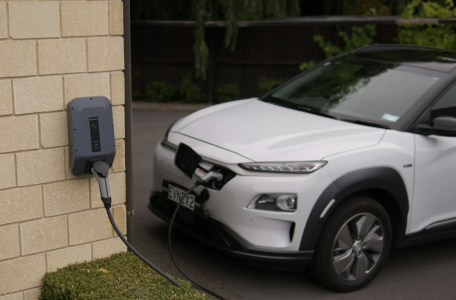Claim your $7,500 car credit before the September 30 deadline
By
Veronica E.
- Replies 0
Thinking about a new car—or just exploring your options?
A major federal tax credit worth up to $7,500 is set to expire soon.
Under a newly passed budget law, this popular incentive will end on September 30, 2025.
That means buyers have a limited window to take advantage of the savings.
After the deadline, this opportunity could disappear entirely.

For years, federal tax credits have played a major role in encouraging the adoption of electric vehicles.
By making them more affordable, these incentives helped the US stay competitive in the global shift toward greener transportation.
But under the new budget law, these credits are being eliminated to cut government spending—an estimated savings of $169 billion over the next decade.
Experts warn this could slow progress.
Harvard researchers project that ending the credits could reduce EV adoption by 6% by 2030—a figure that could have lasting effects on the auto industry and climate goals.
With the clock ticking, EV advocates expect a surge in buyers trying to take advantage of the credits before they expire.
If you’re considering buying or leasing an electric vehicle, it may be wise to act before September 30.
After that, the same vehicle could cost thousands more without the federal credit.
Advocacy groups like the Electrification Coalition say the policy change could put the US behind other countries, like China and those in Europe, who continue to invest heavily in electric vehicle markets.
In addition to ending the EV tax credits, the new law includes other changes that may affect the shift to electric transportation:
Industry analysts say these moves weaken both the incentives (the “carrot”) and the regulations (the “stick”) that have pushed automakers toward electric options in recent years.
Even with credits in place, electric vehicles have faced slow adoption in the US. Here are a few reasons why:
While the new law could slow down the shift to electric vehicles, the conversation is far from over.
If you’re planning to go electric, acting now could save you thousands.
And as technology continues to evolve, new incentives and innovations may appear in the years ahead.
Still, for many automakers and climate advocates, this policy signals a turning point—one that could delay progress just as momentum was building.
Read next: Is Tesla America's most dangerous car? Data reveals shocking truth

Are you planning to take advantage of the EV credit before it’s gone? Or are you waiting for better options, lower prices, or more infrastructure? Share your thoughts—we’d love to hear what’s driving your decision.
A major federal tax credit worth up to $7,500 is set to expire soon.
Under a newly passed budget law, this popular incentive will end on September 30, 2025.
That means buyers have a limited window to take advantage of the savings.
After the deadline, this opportunity could disappear entirely.

Time is running out to take advantage of one of the biggest vehicle-related tax credits in years. Image Source: Pexels / Ed Harvey.
What’s changing—and why it matters
For years, federal tax credits have played a major role in encouraging the adoption of electric vehicles.
By making them more affordable, these incentives helped the US stay competitive in the global shift toward greener transportation.
But under the new budget law, these credits are being eliminated to cut government spending—an estimated savings of $169 billion over the next decade.
Experts warn this could slow progress.
Harvard researchers project that ending the credits could reduce EV adoption by 6% by 2030—a figure that could have lasting effects on the auto industry and climate goals.
Also read: Is your car at risk? See if your vehicle is one of the 276,000 Hyundai, Mercedes-Benz, or Toyota models facing urgent recall!
A short window to act
With the clock ticking, EV advocates expect a surge in buyers trying to take advantage of the credits before they expire.
If you’re considering buying or leasing an electric vehicle, it may be wise to act before September 30.
After that, the same vehicle could cost thousands more without the federal credit.
Advocacy groups like the Electrification Coalition say the policy change could put the US behind other countries, like China and those in Europe, who continue to invest heavily in electric vehicle markets.
Also read: A widely recognized car brand just issued a recall on one of its newest vehicles—are you affected?
What else is in the law?
In addition to ending the EV tax credits, the new law includes other changes that may affect the shift to electric transportation:
- Ends penalties for automakers that fail to meet Corporate Average Fuel Economy (CAFE) standards
- Loosens emissions regulations, easing pressure to move away from gas-powered cars
- Drops proposals like a $250 annual EV fee and a requirement for the US Postal Service to sell off EV delivery vehicles
Industry analysts say these moves weaken both the incentives (the “carrot”) and the regulations (the “stick”) that have pushed automakers toward electric options in recent years.
Also read: Is a car still worth it in retirement? Cities where it pays off
Why some drivers still hesitate on EVs
Even with credits in place, electric vehicles have faced slow adoption in the US. Here are a few reasons why:
- Cost: EVs often have higher upfront prices, even after recent cuts from companies like Tesla and Ford.
- Insurance: Premiums for EVs are typically higher due to costly battery replacements and repair concerns.
- Charging access: Some areas still lack sufficient charging stations, especially in rural or less-populated regions.
- Range limitations: Many drivers worry that EVs can’t travel as far as gas-powered vehicles on a full charge.
- Weather performance: Cold and hot weather can reduce battery efficiency, creating reliability concerns in some climates.
Also read: Ditch the car, keep the comfort: Why families are loving this car-free community
What the future may hold
While the new law could slow down the shift to electric vehicles, the conversation is far from over.
If you’re planning to go electric, acting now could save you thousands.
And as technology continues to evolve, new incentives and innovations may appear in the years ahead.
Still, for many automakers and climate advocates, this policy signals a turning point—one that could delay progress just as momentum was building.
Read next: Is Tesla America's most dangerous car? Data reveals shocking truth
Key Takeaways
- The $7,500 credit for new electric vehicles and the $4,000 credit for used EVs will end on September 30, 2025, due to a new federal budget law.
- The legislation also relaxes fuel economy and emissions standards, signaling a broader slowdown in the US transition to electric vehicles.
- Experts warn the change could reduce EV adoption, hurt US automakers’ global competitiveness, and slow efforts to reduce emissions.
- High costs, limited charging access, and weather-related battery concerns continue to be major reasons Americans hesitate to buy EVs.
Are you planning to take advantage of the EV credit before it’s gone? Or are you waiting for better options, lower prices, or more infrastructure? Share your thoughts—we’d love to hear what’s driving your decision.






